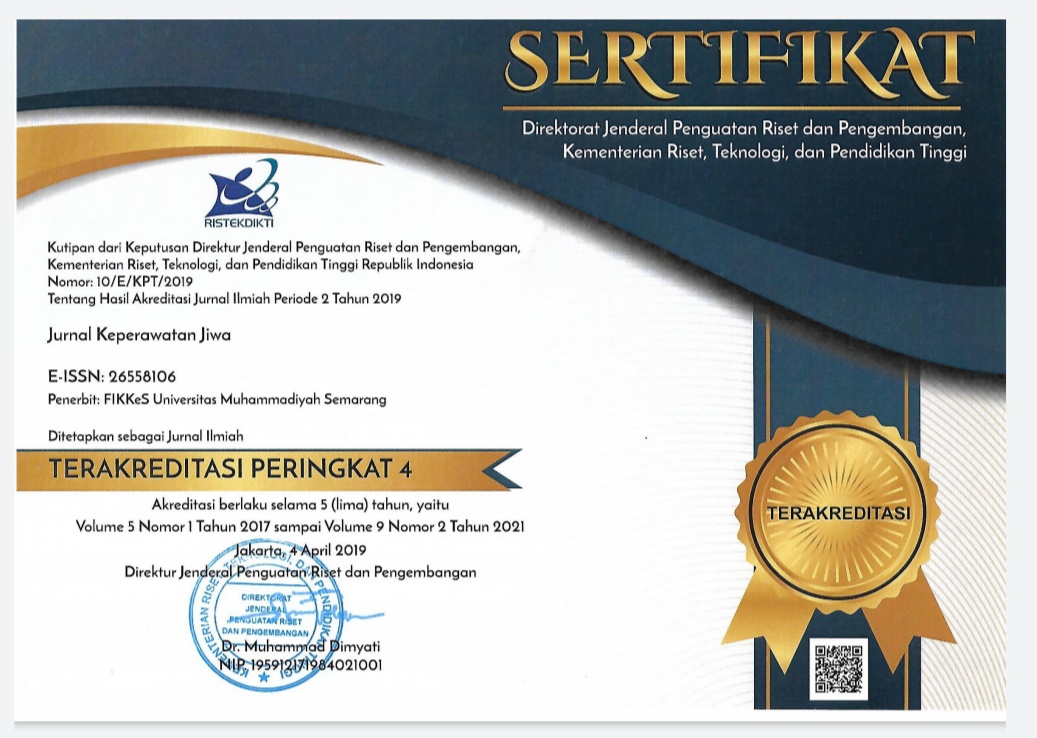Terapi Token Ekonomi untuk Meningkatkan Kepatuhan Terapi: Study Literature Review
(1) Universitas Muhammadiyah Malang
(2) Universitas Muhammadiyah Malang
(3) Universitas Muhammadiyah Malang
(*) Corresponding Author
Abstract
Pasien dengan penyakit kronis yang menjalakan sebuah program terapi terkadang memiliki rasa kejenuhan, munculnya rasa jenuh diakibatkan karena tindakan yang dilakukan secara monoton. Berbagai jenis terapi perilaku dengan pendekatan behavior therapy terus berkembang diaplikasikan untuk meningkatkan kepatuhan, salah satu pendekatan yang popular yaitu dengan penggunaan token economy. Tujuan dari penelitian ini adalah untuk mencari variable yang berkaitan dengan perubahan perilaku pasien yang menjalani terapi menggunakan pendekatan token ekonomi. Penelitian ini dilakukan dengan metode literature review, artikel berasal dari Science Direct, NCBI dan Google Scholar tahun 2015-2020. Sejumlah 80 artikel selanjutnya dilakukan skrining penilaian kualitas artikel menggunakan Joanna Briggs Institute Critical Appraisal dan dipilih sesuai dengan kriteria inklusi menjadi 11 artikel, selanjutnya dilakukan analisis menggunakan software NVIVO 12 plus. Hasil dari penelitian ini didapatkan adanya variable aktifitas fisik, peningkatan kepatuhan sebuah terapi, kepatuhan diet, perubahan perilaku. Temuan lain menujukkan token ekonomi merupakan titik stimulus untuk meningkatkan motivasi untuk modifikasi perilaku dengan cara pemberian reward untuk mengubah perilaku menjadi lebih adaptif.
Keywords
Full Text:
PDFReferences
Al Wahbi, A. (2018). Autoamputation of diabetic toe with dry gangrene: A myth or a fact? Diabetes, Metabolic Syndrome and Obesity: Targets and Therapy, 11, 255–264. https://doi.org/10.2147/DMSO.S164199
Ayurini, R. I., & Parmitasari, D. L. N. (2015). Kepatuhan pengobatan pada pasien kanker. 14, 83–95.
Coelho, L. F., Barbosa, D. L. F., Rizzutti, S., Muszkat, M., Amodeo Bueno, O. F., & Miranda, M. C. (2015). Use of cognitive behavioral therapy and token economy to alleviate dysfunctional behavior in children with attention-deficit hyperactivity disorder. Frontiers in Psychiatry, 6(NOV), 1–9. https://doi.org/10.3389/fpsyt.2015.00167
Hackenberg, T. D. (2009). Token reinforcement: a review and analysis. Journal of the Experimental Analysis of Behavior, 91(2), 257–286. https://doi.org/10.1901/jeab.2009.91-257
Hickey, V., Flesch, L., Lane, A., Pai, A. L. H., Huber, J., Badia, P., … Dandoy, C. E. (2018). Token economy to improve adherence to activities of daily living. Pediatric Blood and Cancer, 65(11). https://doi.org/10.1002/pbc.27387
Hospel, V., Galand, B., & Janosz, M. (2016). Multidimensionality of behavioural engagement: Empirical support and implications. International Journal of Educational Research, 77, 37–49. https://doi.org/10.1016/j.ijer.2016.02.007
Kazdin, A. (2012). The Token Economy: A Review and Evaluation. Retrieved from https://books.google.co.id/books?id=H0t-BgAAQBAJ
Mendoza-Ruiz, A., Dylgjeri, S., Bour, F., Damagnez, F., Leroux, K., & Khirani, S. (2019). Evaluation of the efficacy of a dedicated table to improve CPAP adherence in children: a pilot study. Sleep Medicine, 53, 60–64. https://doi.org/10.1016/j.sleep.2018.08.032
Nasako, R. E. (2016). Effects of Token Economy on Mathematics Achievement of Children with Attention Deficit Hyperactivity Disorder (ADHD) in Government Practising Schools in Buea, Cameroon. International Journal of Humanities, Social Sciences and Education, 3(10), 31–56. https://doi.org/10.20431/2349-0381.0310004
Nastasi, J. A., Sheppard, R. D., & Raiff, B. R. (2020). Token-economy-based contingency management increases daily steps in adults with developmental disabilities. Behavioral Interventions, 35(2), 315–324. https://doi.org/10.1002/bin.1711
Nursalam, & Kurniawati, N. D. (2007). Asuhan Keperawatan pada Pasien Terinfeksi HIV/AIDS. jakarta: salemba medika.
Paris, G., Graziano, L., Perelli, T., Giacomodonato, B., De Marchis, M., Fantacci, C., & Bonci, E. (2017). 264 Occupational therapy to motivate adherence to nebulized therapy among children with cystic fibrosis: a token economy intervention. Journal of Cystic Fibrosis, 16, S130. https://doi.org/10.1016/s1569-1993(17)30606-9
Shih, et all. (2017). REVIEW A systematic review on the impact of diabetes mellitus on the ocular surface. Nutrition & Diabetes, 7(3), e251-10. https://doi.org/10.1038/nutd.2017.4
Tandilolo, J., Komang, N., Gandari, M., Putu, D., & Dewi, R. (n.d.). Pengaruh Pemberian Token Ekonomi terhadap Ruang Kunti Rumah Sakit Jiwa Provinsi Bali. 84–94.
Trevino-Maack, S. I., Kamps, D., & Wills, H. (2015). A Group Contingency Plus Self-Management Intervention Targeting At-Risk Secondary Students’ Class-Work and Active Engagement. Remedial and Special Education, 36(6), 347–360. https://doi.org/10.1177/0741932514561865
Voshmgir, S. (2019). Token Economy: How Blockchains and Smart Contracts Revolutionize the Economy. Retrieved from https://books.google.co.id/books?id=-Wp3xwEACAAJ
Zlomke, K. (2003). The Behavior Analyst Today Token Economy Plus Self -Monitoring to Reduce Disruptive Classroom Behaviors. & Gaughan & Axelrod, 4(2), 177–182.
Article Metrics
Abstract view : 1295 timesPDF - 299 times
DOI: https://doi.org/10.26714/jkj.9.1.2021.35-44
Refbacks
- There are currently no refbacks.

This work is licensed under a Creative Commons Attribution 4.0 International License.
PPNI Univ. Muhammadiyah Semarang
Jl. Kedungmundu Raya No. 18 Semarang Gedung NRC University of Muhammadiyah Semarang
Phone: 02476740287
Fax: 02476740287
Email: [email protected]
This work is licensed under a Creative Commons Attribution 4.0 International License.


